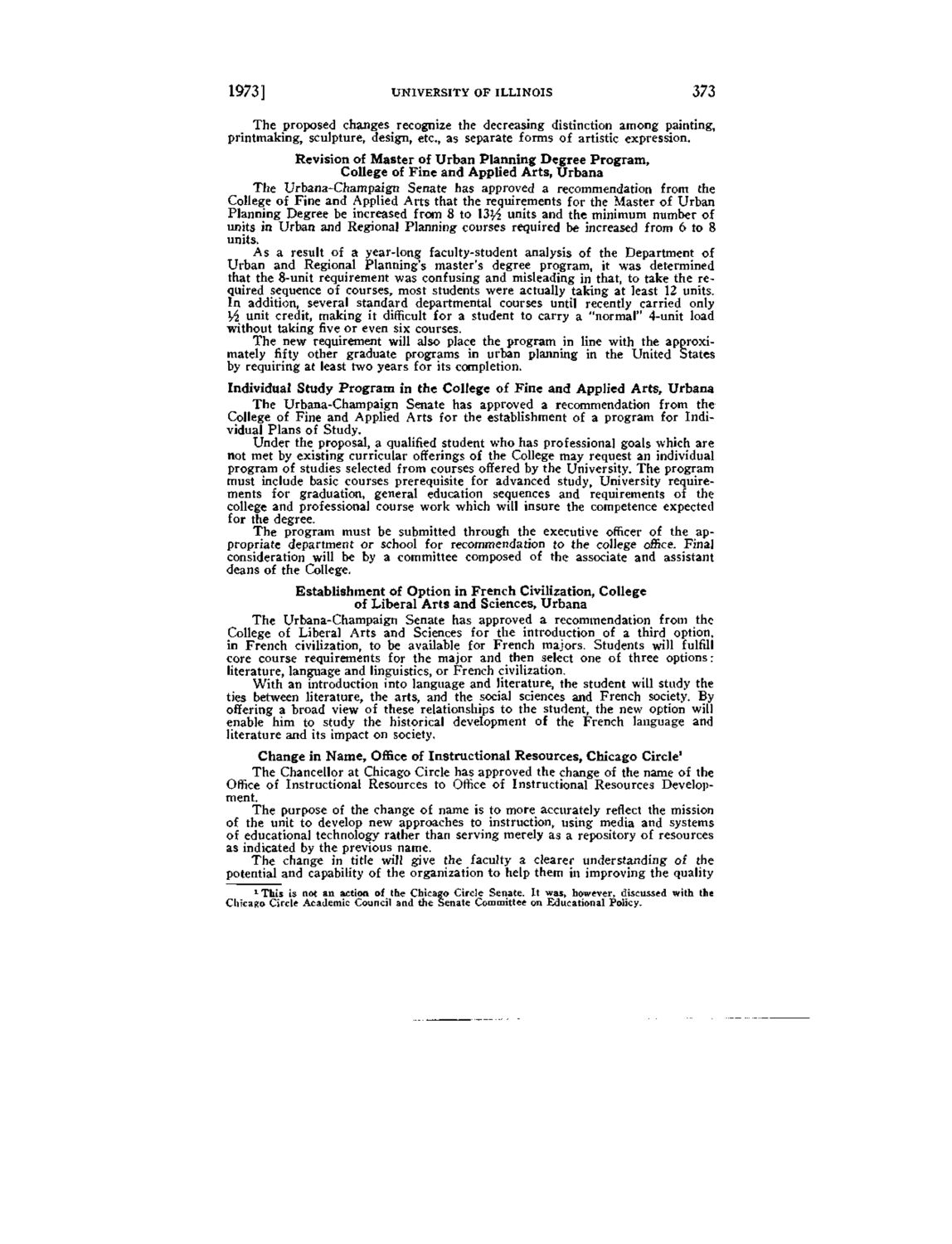| |
| |
Caption: Board of Trustees Minutes - 1974
This is a reduced-resolution page image for fast online browsing.

EXTRACTED TEXT FROM PAGE:
1973] UNIVERSITY OF ILLINOIS 373 The proposed changesrecognize the decreasing distinction among painting, printmaking, sculpture, design, etc., as separate forms of artistic expression. Revision of Master of Urban Planning Degree Program, College of Fine and Applied Arts, Urbana The Urbana-Champaign Senate has approved a recommendation from the College of Fine and Applied Arts that the requirements for the Master of Urban Planning Degree be increased from 8 to 13^ units and the minimum number of units in Urban and Regional Planning courses required be increased from 6 to 8 units. As a result of a year-long faculty-student analysis of the Department of Urban and Regional Planning's master's degree program, it was determined that the 8-unit requirement was confusing and misleading in that, to take the required sequence of courses, most students were actually taking at least 12 units. In addition, several standard departmental courses until recently carried only y£ unit credit, making it difficult for a student to carry a "normal" 4-unit load without taking five or even six courses. The new requirement will also place the program in line with the approximately fifty other graduate programs in urban planning in the United States by requiring at least two years for its completion. Individual Study Program in the College of Fine and Applied Arts, Urbana The Urbana-Champaign Senate has approved a recommendation from the College of Fine and Applied Arts for the establishment of a program for Individual Plans of Study, Under the proposal, a qualified student who has professional goals which are not met by existing curricular offerings of the College may request an individual program of studies selected from courses offered by the University, The program must include basic courses prerequisite for advanced study, University requirements for graduation, general education sequences and requirements of the college and professional course work which will insure the competence expected for the degree. The program must be submitted through the executive officer of the appropriate department or school for recommendation to the college office. Final consideration will be by a committee composed of the associate and assistant deans of the College. Establishment of Option in French Civilization, College of Liberal Arts and Sciences, Urbana The Urbana-Champaign Senate has approved a recommendation from the College of Liberal Arts and Sciences for the introduction of a third option, in French civilization, to be available for French majors. Students will fulfill core course requirements for the major and then select one of three options r literature, language and linguistics, or French civilization. With an introduction into language and literature, the student will study the ties between literature, the arts, and the social sciences and French society. By offering a broad view of these relationships to the student, the new option will enable him to study the historical development of the French language and literature and its impact on society. Change in Name, Office of Instructional Resources, Chicago Circle" The Chancellor at Chicago Circle has approved the change of the name of the Office of Instructional Resources to Office of Instructional Resources Development. The purpose of the change of name is to more accurately reflect the mission of the unit to develop new approaches to instruction, using media and systems of educational technology rather than serving merely as a repository of resources as indicated by the previous name. The change in title will give the faculty a clearer understanding of the potential and capability of the organization to help them in improving the quality L Thi5 is not an action of the Chicago Circle Senate. It was, however, discussed with the Chicago Circle Academic Council and the Senate Committee on Educational Policy.
| |